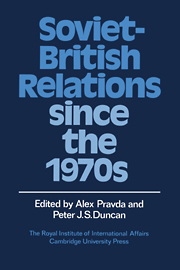Book contents
- Frontmatter
- Contents
- Contributors
- Acknowledgments
- 1 Introduction: pre-perestroika patterns
- 2 The historical perspective
- 3 Soviet perspectives on Britain and British foreign policy
- 4 British perspectives on the Soviet Union
- 5 The security dimension
- 6 Anglo-Soviet relations: political and diplomatic
- 7 The Soviet Union and the Left in Britain
- 8 Anglo-Soviet cultural contacts since 1975
- 9 Trade relations: patterns and prospects
- 10 Doing business with the USSR
- 11 Conclusions: Soviet-British relations under perestroika
- Index
4 - British perspectives on the Soviet Union
Published online by Cambridge University Press: 29 October 2009
- Frontmatter
- Contents
- Contributors
- Acknowledgments
- 1 Introduction: pre-perestroika patterns
- 2 The historical perspective
- 3 Soviet perspectives on Britain and British foreign policy
- 4 British perspectives on the Soviet Union
- 5 The security dimension
- 6 Anglo-Soviet relations: political and diplomatic
- 7 The Soviet Union and the Left in Britain
- 8 Anglo-Soviet cultural contacts since 1975
- 9 Trade relations: patterns and prospects
- 10 Doing business with the USSR
- 11 Conclusions: Soviet-British relations under perestroika
- Index
Summary
A NATIONAL PERSPECTIVE
The concept of a national perspective on another country is at once important and elusive. National perspectives set the context within which policy choices are made; they encompass what is deemed to be possible and they condition policy makers’ and the public's views of how another society will respond to its policies. Yet it is almost impossible to offer a precise analysis of what constitutes a national perspective, for it is made up of a series of historical, social and political factors, interacting and constantly changing to produce a series of images, stereotypes and expectations, that must somehow offer a guide to action.
Any analysis of British perspectives on the Soviet Union, therefore, must take account of some obvious methodological problems. To begin with, there is no way in which British and Soviet perspectives of each other can be seen as mirror images. Both societies are too different. It is difficult to measure British public opinion with great precision, and the relationships between public opinion and official opinion, or between public attitudes and policy, have to be stated very tentatively. In the case of the Soviet Union, notwithstanding the fact that one or two public opinion polls now exist, there is nevertheless no accumulation of such data over time and its relationship to policy and officialdom would have to be approached in a completely different way. As in so many other respects, Britain and the Soviet Union are asymmetrical societies and assumptions we make about our own society - so often the prism through which we form our expectations of other societies - cannot easily be transferred to the Soviet Union.
- Type
- Chapter
- Information
- Soviet-British Relations since the 1970s , pp. 68 - 91Publisher: Cambridge University PressPrint publication year: 1990
- 2
- Cited by



